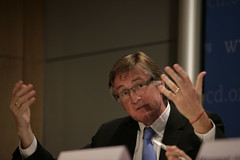ASIA
25 June 2014
Trade unions call for more responsible business conduct
Global trade union leader, Philip Jennings, will be making a call for more responsible business conduct at an OECD global forum this week.
Global trade union leader, Philip Jennings, will be making a call for more responsible business conduct at an OECD global forum this week.
Jennings is General Secretary of UNI Global Union which represents more than 20 million service workers from over 900 trade unions. UNI Global Union is mandated to ensure that their jobs are decent and that workers’ rights are protected, including the right to join a union and collective bargaining.
Among UNI Global Union's workers are those in Bangladesh's textile sector, some of whom have been killed or injured from building collapses and fires due to appalling working conditions and breaches of local regulations. The most shocking incident was the Rana Plaza factory collapse on 24 April 2013 which claimed the lives of 1,138 garment workers.
UNI led the drafting of the Bangladesh Accord on Fire and Building Safety which has been signed by over 180 global brands from 20 countries in Europe, North America, Asia and Australia. These brands source many of their products in Bangladesh and other developing countries.
Jennings said "the Bangladesh Accord shows that global agreements with multinationals can safeguard workers’s rights and create responsible businesses".
Jennings added, “The Bangladesh Accord changed the rules of the game not only in Bangladesh but along the whole supply chain from factory to shop floor. The Accord is making a practical difference -- by October we will have inspected over 1500 factories. There can be no return to the DIY inspections which have costs so many lives".
This week's global forum will review activities under the OECD Guidelines for Multinational Enterprises which are recommendations for responsible business conduct.
“The OECD is to be applauded for backing the Bangladesh Accord," Jennings insisted. "Now we need the national contact points to be more active in helping to reach a settlement that takes into account the terrible loss the Rana Plaza victims and families have experienced."
UNI is calling for a sea change in corporate behavior, especially among the Amazons, Walmart, Prosegurs and T-Mobiles. The Bangladesh Accord shows there is a better way, by using global framework agreements with multinationals to safeguard workers’ rights and ensure responsible business.
Jennings is General Secretary of UNI Global Union which represents more than 20 million service workers from over 900 trade unions. UNI Global Union is mandated to ensure that their jobs are decent and that workers’ rights are protected, including the right to join a union and collective bargaining.
Among UNI Global Union's workers are those in Bangladesh's textile sector, some of whom have been killed or injured from building collapses and fires due to appalling working conditions and breaches of local regulations. The most shocking incident was the Rana Plaza factory collapse on 24 April 2013 which claimed the lives of 1,138 garment workers.
UNI led the drafting of the Bangladesh Accord on Fire and Building Safety which has been signed by over 180 global brands from 20 countries in Europe, North America, Asia and Australia. These brands source many of their products in Bangladesh and other developing countries.
Jennings said "the Bangladesh Accord shows that global agreements with multinationals can safeguard workers’s rights and create responsible businesses".
Jennings added, “The Bangladesh Accord changed the rules of the game not only in Bangladesh but along the whole supply chain from factory to shop floor. The Accord is making a practical difference -- by October we will have inspected over 1500 factories. There can be no return to the DIY inspections which have costs so many lives".
This week's global forum will review activities under the OECD Guidelines for Multinational Enterprises which are recommendations for responsible business conduct.
“The OECD is to be applauded for backing the Bangladesh Accord," Jennings insisted. "Now we need the national contact points to be more active in helping to reach a settlement that takes into account the terrible loss the Rana Plaza victims and families have experienced."
UNI is calling for a sea change in corporate behavior, especially among the Amazons, Walmart, Prosegurs and T-Mobiles. The Bangladesh Accord shows there is a better way, by using global framework agreements with multinationals to safeguard workers’ rights and ensure responsible business.




